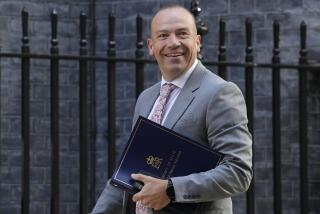Inspections of IRA Weapons Are the Surest Road to Peace in Ulster
- Share via
Expecting the Irish Republican Army to surrender its weapons in Northern Ireland is like expecting militant 2nd Amendment proponents in the U.S. to agree to gun control legislation: It’s not going to happen any time soon and especially not at the behest of the government. This is true in Ireland despite the inspection of IRA arms dumps by international observers carried out in secret last week by former Finnish President Martti Ahtisaari and African National Congress veteran Cyril Ramaphosa.
The inspections, nevertheless, are a breakthrough, achieved in the face of intransigent opposition among hardened traditionalists in the IRA. Undesirable as it may be, ownership of substantial weapons caches, so long as they’re kept “verifiably beyond use” (in IRA terminology), won’t interfere with the daily functioning of government in Northern Ireland. Here in the U.S., according to the Anti-Defamation League, organized and armed militia groups with members numbering several thousand operate in at least 30 states. Outbreaks of violence occasionally result from this, but life (and politics) continues largely undisturbed.
Further, because the membership of the IRA overlaps that of its political ally, Sinn Fein, the latter does exercise some control over the former. And being part of the government can only encourage Sinn Fein to focus on political and social reform through the democratic process.
The IRA has held stockpiles of weapons and explosives in Ireland since its formation in 1919. Since then, arms periodically were dumped in bunkers, often for decades at a time, for later use. British government officials estimate that the organization holds about 1,000 rifles, 500 handguns, 50 machine guns and tons of plastic explosives, as well as mortars, grenades, rocket launchers, surface-to-air missiles and flame-throwers.
Irish activists have been fighting against British rule in Ireland for hundreds of years. In the 30 years of conflict ending with the current peace process, the goals of the IRA’s armed struggle have been to force the British army out of Ulster; a reunification of Ireland, north and south; and to fight abuses by the Protestant unionist majority and the security forces against the Catholic nationalist minority in jobs, housing, voting and other sectors. As long as these goals remain distant, it’s unlikely that the sentiment that draws members to the IRA will disappear.
In the day-to-day world of ensuring equal opportunities and rights for all who live in Northern Ireland, much remains to be done. Reform of the police force, the Royal Ulster Constabulary, will be the next major hurdle of the peace process. Nine out of 10 police officers are Protestant, compared with just over half of the population. Security forces still conduct unannounced searches in Catholic homes. According to U.S. officials, President Clinton, who would like to add peace in Northern Ireland to his legacy, believes that to bow to unionist demands on the RUC would be “like leaving Alabama and Georgia under all-white cops.”
In addition, Irish Prime Minister Bertie Ahern has called for more British troop withdrawals, accusing the army of harassing nationalist communities in border areas. The Irish government says that peacetime troop levels should be no more than 3,000, close to “pre-Troubles” levels, There now are 11,500 troops, and 2,000 more British soldiers are expected in Belfast for the annual unionist “summer marching season,” traditionally an opportunity to publicly celebrate old battle conquests against Catholics.
Another outstanding issue is the status of the unionist paramilitary organizations. Also well-armed and observing a shaky cease-fire (less than two weeks ago, the Ulster Freedom Fighters threatened to end theirs), these groups are coming under increasing pressure to disarm or at least make some gesture, perhaps opening up their weapons stockpiles to inspection, like the IRA’s initiative.
Enough progress has been made to move ahead with democratic government in Northern Ireland. The peace process has the overwhelming support of the Irish people, north and south. Consequential and inclusive debate on social and economic issues lessens the need for the IRA to resume active military activity.
Rightfully skeptical observers will be reassured if future weapons inspections show that the IRA is keeping its promises. The inspections do not solve the problem. But they remove the constant start-stop nature of the Northern Ireland peace process until the time when weapons become unnecessary, which is exactly what will happen if police reform, demilitarization and democratic government are allowed to succeed.
More to Read
Sign up for Essential California
The most important California stories and recommendations in your inbox every morning.
You may occasionally receive promotional content from the Los Angeles Times.













